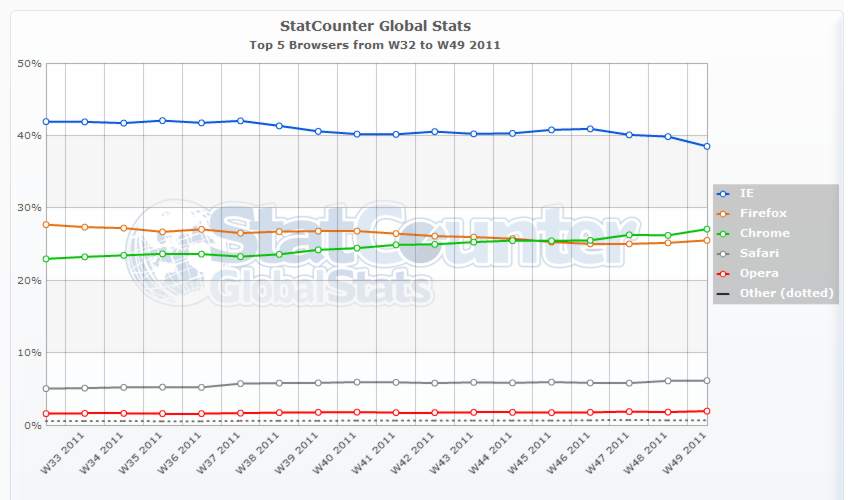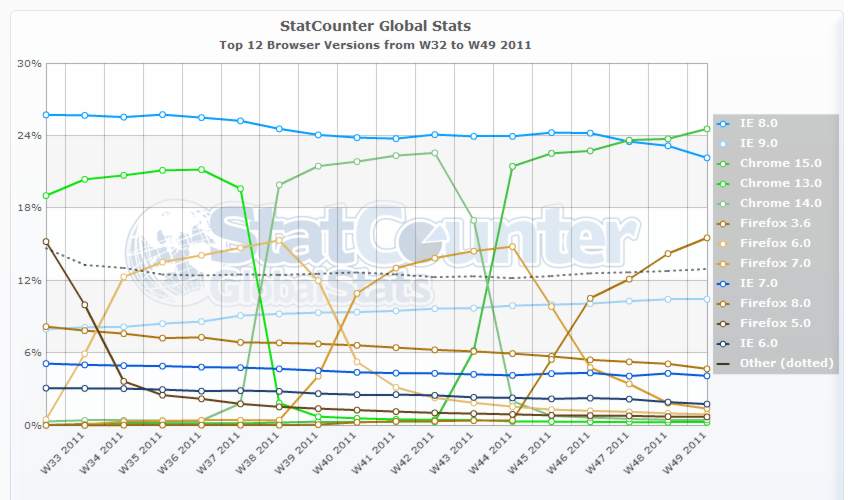| Chrome 15 - World's Most Popular Browser |
| Written by Ian Elliot | |||
| Thursday, 15 December 2011 | |||
|
The browser universe is changing with Microsoft no longer in charge of what constitutes a de facto web standard. Now the role seems to belong to the Gecko and WebKit layout engines aka Firefox and Chrome. For the first time, Chrome 15 has claimed the top spot in the league of most used browsers - but only just. Based on a sample of 15 billion page views, StatCounter reports that Chrome 15 has 23.6% of the worldwide market compared to IE 8 at 23.5% - with such a small difference the two are more properly tied at first place. If you aggregate all versions of each browser, then IE still leads the pack but with Chrome in second place. Chrome over took Firefox in November. From a programmer's point of view, Firefox plus Chrome beats all versions of IE with a 62% share of the market. This means that Firefox/Chrome takes on what constitutes a de facto standard, and this is more important than what Microsoft selects or refuses to support.
Click to enlarge
If you restrict the analysis to modern, i.e. HTML5-supporting browsers then the situation is even more clear cut. IE9 has only 10% of the total market compared to Chrome 15's 25% and Firefox 8's 16%. What this means is that at least 45% of the browsers that visit a site will support HTML5, including many of the features that Microsoft refuses to support - WebGL for example. These figures also put Google's support for Mozilla into focus. In previous years Google has contributed most of Mozilla's income in return for being the default Firefox search engine. Now that Chrome has over taken Firefox this looks like a much less important factor.
Click to enlarge
Another interesting feature highlighted by the data is the effect of rapid and automatic upgrades. If you look at the chart then you can see that usage of Chrome 14 fell to nothing as Chrome 15 was released. You can see the same massive swing from Firefox 7 to Firefox 8 but notice that it is slower to reach the same percentage. You can interpret this as Firefox users being slower to allow the automatic upgrade or as Firefox users taking the upgrade opportunity to switch to another browser. Microsoft has just announced that, starting in January, it too will auto-update IE. If you have auto-updates on, IE6 or 7 will be silently upgraded to IE8 or IE9 if the OS is Vista or later. Of course, from the programmer's point of view this is a good move. However, Microsoft's motivation is most probably to consolidate its position with a larger market share for its more up-to-date browsers. What is very obvious is that there is no such sudden switch behaviour for the legacy browsers that aren't part of the auto-updates. These just die away painfully slowly. So what can we take away from these statistics?
To put this another way, the world is moving from one dominated by the Trident layout engine used in IE to one dominated by WebKit and Gecko with WebKit growing at the others' expense.
Further ReadingOriginal data including by country statistics Internet Explorer loses market share
To be informed about new articles on I Programmer, subscribe to the RSS feed, follow us on Google+, Twitter or Facebook or sign up for our weekly newsletter.
|
|||
| Last Updated ( Thursday, 15 December 2011 ) |


